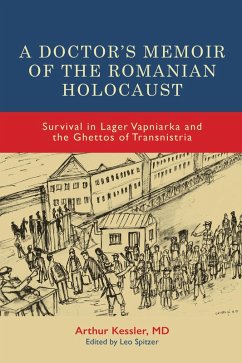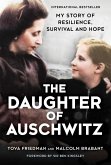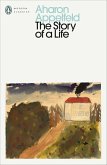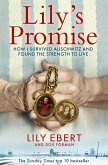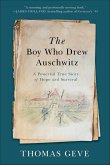Based on notes kept while incarcerated in the concentration camps and ghettos of Transnistria, Dr. Kessler's gripping Holocaust memoir tells a story of calculated murder, resistance, and survival.
In the aftermath of the Romanian Holocaust, Transnistria, a little-known region north of Odessa, between the Dniester and Bug rivers, came to be known as "the forgotten cemetery." Between 1941 and 1944, an estimated 300,000 Jews were killed or died there from starvation and disease. This memoir by Dr. Arthur Kessler, based on daily notes he kept as a physician during his two-year imprisonment in Transnistria's Vapniarka concentration camp and Olgopol ghetto, provides a unique perspective of a Jewish medical doctor who witnessed murderous death as well as brave acts of resistance and survival.
Introduced and annotated by historian Leo Spitzer and translated from German by the late Margaret Robinson, Dr. Kessler's memoir provides an engrossing account of his infamous discovery that Vapniarka's Romanian authorities routinely, and it seems knowingly, fed camp inmates a daily soup containing toxic chickling peas (Lathyrus sativus) that induced paralysis, kidney failure, and oftentimes death. It reveals the daring by which he, together with fellow inmate medical associates, saved hundreds of lives by organizing a hunger strike that resulted in the camp's dissolution and the prisoners' relocation to ghettos throughout Transnistria. Kessler's narrative continues with an account of privileges attainable by deportees with useful skills and provides illuminating details about informal systems and practices that enabled many to survive and to provide care to fellow victims of genocidal persecution.
The memoir is illustrated with moving drawings produced by prisoners in the Vapniarka concentration camp and presented to Dr. Kessler in recognition of his brave work of healing.
In the aftermath of the Romanian Holocaust, Transnistria, a little-known region north of Odessa, between the Dniester and Bug rivers, came to be known as "the forgotten cemetery." Between 1941 and 1944, an estimated 300,000 Jews were killed or died there from starvation and disease. This memoir by Dr. Arthur Kessler, based on daily notes he kept as a physician during his two-year imprisonment in Transnistria's Vapniarka concentration camp and Olgopol ghetto, provides a unique perspective of a Jewish medical doctor who witnessed murderous death as well as brave acts of resistance and survival.
Introduced and annotated by historian Leo Spitzer and translated from German by the late Margaret Robinson, Dr. Kessler's memoir provides an engrossing account of his infamous discovery that Vapniarka's Romanian authorities routinely, and it seems knowingly, fed camp inmates a daily soup containing toxic chickling peas (Lathyrus sativus) that induced paralysis, kidney failure, and oftentimes death. It reveals the daring by which he, together with fellow inmate medical associates, saved hundreds of lives by organizing a hunger strike that resulted in the camp's dissolution and the prisoners' relocation to ghettos throughout Transnistria. Kessler's narrative continues with an account of privileges attainable by deportees with useful skills and provides illuminating details about informal systems and practices that enabled many to survive and to provide care to fellow victims of genocidal persecution.
The memoir is illustrated with moving drawings produced by prisoners in the Vapniarka concentration camp and presented to Dr. Kessler in recognition of his brave work of healing.
Dieser Download kann aus rechtlichen Gründen nur mit Rechnungsadresse in A, D ausgeliefert werden.

